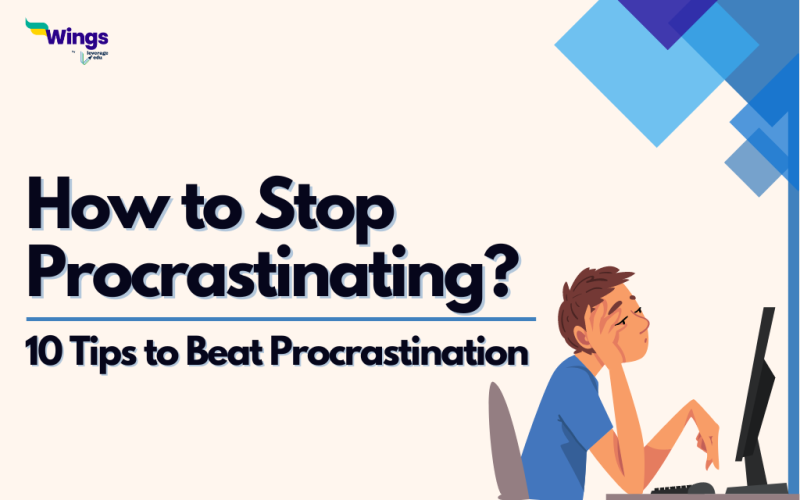Do you remember when you were working and then stopped to check Instagram, scroll through reels, look for online shopping or think about some random thoughts? Yes, that is procrastination. Procrastination is an act of delaying or postponing something or a task to spend time on something more enjoyable. People tend to delay boring tasks. However, it is a matter of concern when people put important tasks on hold. This may lead to the failure to complete an important job, reducing productivity.
If you want to learn more about how to stop procrastinating, continue reading the blog
This Blog Includes:
Also Read: How to Deal with Failures?
Scientific Ways to Stop Procrastination
Check out these scientific methods to stop procrastination:
- Instead of managing all of your tasks at once, focus on one specific work that you have been putting off and complete it first.
- Start now. There is no right time to start working on something. You must believe in taking immediate action. This will help you avoid having distracting thoughts.
- Break down big tasks into smaller ones. It will reduce your pressure and offer you a sense of fulfilment after those tasks are completed.
- Challenge yourself or make a bet with a friend to complete a task within a set time. This will motivate you to put your effort into the task.
- Set a deadline for each task and stick to it. Give yourself a realistic goal and do your best to achieve it.
- Reward yourself for completing any task, no matter how big or small. This will encourage you to take on more tasks that you want to accomplish.
Also Read: How can Schools Prioritize Mental Health?
10 Ways to Stop Procrastination
Take a look at these effective ways how to stop procrastinating:
Acknowledge Your Procrastination
In order to stop procrastinating, one must first acknowledge their habit of doing so. Delaying tasks for higher-priority work is not necessarily procrastination. However, if you are ignoring the task at hand for anything not important, then it’s time to be careful.
Figure Out The Reason For Your Procrastination
You must try to figure out why you are procrastinating on your task. Many people procrastinate because they find a specific task not interesting or boring. Another reason could be that your tasks are disorganised, preventing you from overcoming your procrastination. Other factors include poor decision-making skills, lack of interest, lack of willpower, etc.
Must Read: How to Break Bad Habits?
Make An Anti-Procrastination Plan
Procrastination can become a long-term habit that can affect your productivity. With a few simple steps, you can gradually change this habit.
- Forgive yourself for your past procrastination.
- Organise and prioritise your tasks for the day.
- Be focused and commit to the task at hand.
- Reward yourself after successfully completing a task.
Keep A To-Do List
Make a to-do list of all the tasks for the day and allocate realistic time slots for each one of them. This allows you to do your work in a given period of time and keeps you from postponing it.
Adopt Active Procrastination
Turn your procrastination habit into something useful. Instead of pursuing a not-so-important task, consider doing useful things like reading something important, doing pre-preps for the next task in the queue, setting up deadline reminders, and so on.
Do The Hardest Task First
Since many people are more active at the start of the day, it is best to complete the most difficult activity at that time. This will provide a sense of satisfaction after completing a difficult task.
Must Read: How to Deal With Pressure of Stressful Situations?
Give Yourself A Pep Talk
Nobody knows you better than yourself. To achieve your goals, you must first motivate yourself to calm down and focus. Assure yourself that you can manage all tasks well and just set reasonable goals for yourself.
Do Not Pressurise Yourself
Too much pressure or stress will make it difficult for you to complete your job. Do not be too hard on yourself or get frustrated if you are unable to stop procrastination in the first place. It is a habit that will eventually fade away with consistent small steps every day.
Set An Environment
Pick a place where you are less likely to procrastinate. A comfortable working environment can have a significant impact on your productivity.
Manage Your Screen Time
A Pro Tip: Keep your app notifications on mute to avoid being tempted to check your device for unnecessary things. Instead, use it wisely. Use alert or productive apps to avoid procrastination.
Also Read: How to Be More Confident?
Related Reads:
FAQs
Ans. Some of the observable effects of procrastination are given below:
Create a feeling of anxiety or pressure.
Negatively affect your productivity.
Render you to miss out on the deadline
Make you irresponsible
Ans. Given below are the tips for how to stop procrastinating for students:
Avoid mobile phone distractions.
Pick a peaceful study location.
Take necessary breaks.
Work with study groups.
Ans. Procrastination is not laziness but something that develops from stress in our lives that hinders us from relaxing our minds and focusing on something. This can also be from negative beliefs we have about ourselves.
We hope that this blog has provided you with relevant information on how to stop procrastinating. For more information on such informative content, visit our career counselling page and follow Leverage Edu.


 One app for all your study abroad needs
One app for all your study abroad needs












 60,000+ students trusted us with their dreams. Take the first step today!
60,000+ students trusted us with their dreams. Take the first step today!